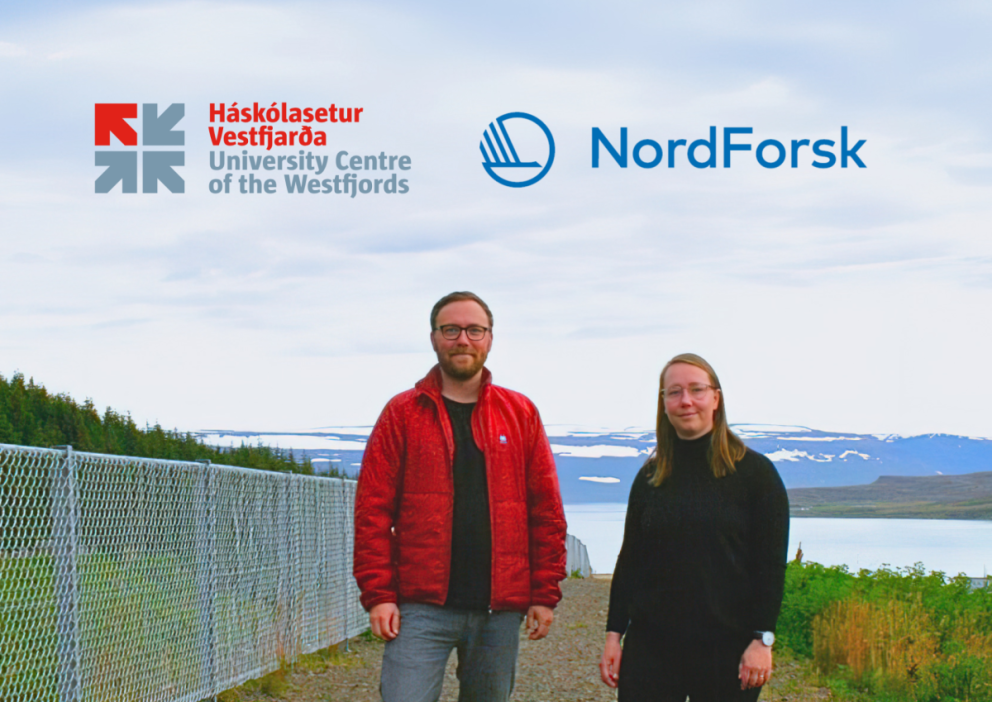Two major research projects begin today
Today marks the official launch of two major research projects for which the University Centre of the Westfjords received grants last winter. Both projects are funded by the NordForsk Sustainable Development of the Arctic programme. Dr. Matthias Kokorsch, who is now on leave from his work as Academic Director of the Master’s in Coastal Communities and Regional Development, will lead the projects as Research Specialist and Project Leader. He joined an international consortium as a co-applicant and successfully secured the grants on behalf of UW through a very competitive process. Out of about 200 applications submitted to NordForsk, only nine projects received funding—two of which involve UW. NordForsk has allocated more than 330 million NOK to these nine projects as part of a major investment in the Arctic. Matthias will work in close collaboration with Dr. Jóhanna Gísladóttir from the Agricultural University of Iceland, who will take on a 25% researcher position at UW, along with other international partners.
LostToClimate
The first research project is “LostToClimate” (Addressing Unavoidable Non-Economic Losses to Climate-Induced Events for Communities in the Arctic), a four-year project that will conclude in 2029. The project investigates unavoidable losses—other than economic ones—that Arctic communities experience due to climate change. This collaborative initiative brings together scientists and communities from Finland, Sweden, Norway, the Faroe Islands, Iceland, Greenland, Canada, and the United States, including several Indigenous communities, to generate new knowledge that can support future adaptation.
According to the project description, the Arctic is one of the fastest-warming regions on Earth, leading to coastal erosion, permafrost thaw, wildfires, and declining sea ice. Despite adaptation measures, these changes undermine community well-being, both economically (e.g., by damaging infrastructure) and non-economically (e.g., by harming cultural heritage and impacting mental health). The LostToClimate project will employ diverse ethnographic methods, including arts-based approaches, to engage communities in constructive dialogue about the changes they face due to climate change.
The project will focus on four main topics: Identifying what types of losses Arctic communities are experiencing, examining how these communities cope with such losses through adaptation strategies, determining how to present the evidence necessary to shape just responses to non-economic losses and damages and assessing what measures Arctic communities themselves prefer to reduce the impacts of climate change.
One aspect Matthias and Jóhanna wish to explore is what the future holds for Iceland’s farming communities. Sheep farming has been practiced in Iceland for over a thousand years. The rhythm of the seasons, the free-roaming flocks, and the autumn réttir (sheep round-up) are woven into the nation’s identity. But the situation is changing—farmers are struggling, and climate change may make things even harder. Extreme weather, avalanches, and landslides threaten not only livelihoods but entire communities. The risk is not only economic; it is cultural and social. If current trends continue, Iceland could lose part of its heritage that money cannot restore. Even those who continue sheep farming may one day need to relocate their homes or livestock—temporarily or permanently—to avoid danger.
To better understand these challenges, Matthias and Jóhanna will visit farmers in different parts of Iceland. Through interviews and workshops, they will listen to their experiences, explore possible futures, and highlight what is truly at stake.
ARCHAIC
The second research project is “ARCHAIC” (Sustainable and Resilient Communities in Remote Settlements in the Arctic in the Age of Climate Change), a three-year project running until 2028. It is an internation collaboration with partners from Norway, Greenland and Denmark. The main objective of ARCHAIC is to generate new knowledge on climate change adaptation and responses to natural hazards in remote Arctic communities, with a focus on sustainability and resilience.
The project is multifaceted and includes mapping the main risks faced by Arctic communities and assessing how they can respond, improving forecasting and emergency response planning through the development and implementation of effective early-warning systems for natural hazards, and exploring how communities can prepare for and carry out relocations in the wake of increased natural hazards and climate change. Additionally, the project aims to strengthen community capacity to handle emergencies and minimize the impacts of natural disasters through targeted preparedness, while using the insights and lessons from the research to support other regions facing similar challenges.
UW, with Matthias and Jóhanna at the forefront, will lead research on potential community relocations from high-risk areas. The interdisciplinary set-up of the research team is an original aspect of the project, since there is a lack of an interdisciplinary societal safety perspectives on climate change, natural hazards and adaptation. Experiences from the High Arctic will be valuable for other parts of the Arctic and the rest of the world.
